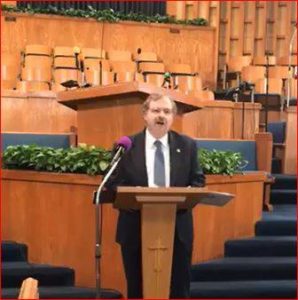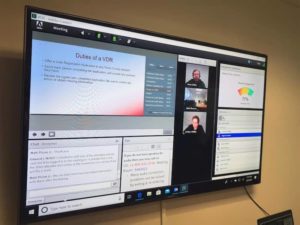 In order to raise awareness of civics and government in Travis County, Austin Tech Alliance conducts periodic Q&A with our elected officials. Up this month: Travis County Tax Assessor-Collector, Voter Registrar Bruce Elfant
In order to raise awareness of civics and government in Travis County, Austin Tech Alliance conducts periodic Q&A with our elected officials. Up this month: Travis County Tax Assessor-Collector, Voter Registrar Bruce Elfant
How would you describe your work with Travis County?
The Travis County Tax Office provides the following services on behalf of our residents;
– Collects more than $4.5 Billion in property taxes to fund 130 local governmental jurisdictions.
– Registers vehicles and transfers vehicle titles for more than 1.4 million vehicles in Travis County.
– Registers Travis County voters.
I am very proud of the services we provide and for encouraging our residents to pay property taxes and register their vehicles online. Hopefully Texans will also soon be able to register to vote online.
What do you love about Travis County and what makes it unique?
Travis County has such a wonderful mix of beauty, technology, state government, educational institutions, students, art, music and food. We are certainly not without our challenges but there is no other place in Texas I would rather live.
What does a day in the life of the Travis County Tax Assessor-Collector and Voter Registrar and how has it changed due to the coronavirus pandemic?
Our office has been closed to the public since mid-March. Meetings with employees, customers and others which used to take place in person, now take place on one of the online platforms. Some Travis County Tax Office employees are able to work from home. My job is to work collaboratively with our department managers, other County departments, outside agencies and the Texas Legislature to ensure that we are able to provide our services efficiently and in accordance with State law.
 What challenges are you seeing the Travis County Tax Office encounter during the coronavirus pandemic and how do you plan to face them?
What challenges are you seeing the Travis County Tax Office encounter during the coronavirus pandemic and how do you plan to face them?
While some of our services are able to be provided online or by mail or phone, the shelter in place orders have seriously curtailed title and voter registration services. Just as is the case with businesses, government entities, etc. all over the globe, we are having to innovate on a fast track. I am sure that many initiatives which come out of this horrible experience will significantly change our business operations and our lives, hopefully mostly for the better.
Travis County hosted Texas’ first virtual Volunteer Deputy Registrar (VDR) training this month. What is a VDR and why is it necessary to conduct VDR training during the coronavirus pandemic?
Volunteer Deputy Registrars are individuals who are trained and sworn in by local voter registrars on behalf of the State of Texas to register voters. We are proud that Travis County has recruited the largest number of VDRs in Texas (more than 4,000) and that the Austin Tech Alliance is one of our great voter registration partners. Previously, we held in person VDR training sessions several times each month. When everything shut down we were forced to find other ways to recruit VDRs and register voters. The initial online VDR training was a real success and we are setting up a schedule for future training sessions.
 What did you learn from the process of conducting a virtual training? Do you plan to continue virtual training through and after the coronavirus pandemic?
What did you learn from the process of conducting a virtual training? Do you plan to continue virtual training through and after the coronavirus pandemic?
It’s important that the training sessions be interactive and we took advantage of the chat feature to enable questions to be asked and answered. I expect we will also entertain live questions. So much of the learning occurs from the Q&A.
What have you learned from nearly three decades of experience as a public servant?
Just like in the business world, we have to always be looking for a better way to “build a mouse trap.” We have to keep up with technology, customer services and HR best practices. Many good ideas come from the industry and association literature but I have also learned to listen carefully to our employees and customers for ways to improve our operations.
Why is civic engagement important?
Civic engagement is the engine of our democratic form of government. Those we elect and the decisions they make are only as good as the electoral and constituent input they receive. One example: I have lived in Austin since 1976. When I got here there was absolutely no traffic. Forty-four years later we are one of the most congested cities in the nation. During this time voter turnout in local elections sunk to 7% of registered voters. If more people had voted and held their elected representatives accountable over the last 4 decades, we might not be as congested today.
It is our right and our responsibility as citizens to actively engage in the affairs of our community, state and nation.
 How might the upcoming 2020 Census affect your work in Austin and Travis County?
How might the upcoming 2020 Census affect your work in Austin and Travis County?
The U. S. Census count determines the population counts to be used for redistricting and more than $800 Billion in Federal funding. The 2010 undercount in Travis County contributed ours being the largest county in the nation without a single congressional district (of the 5 districts we were carved in to), having the majority of the population. It’s hard to get the attention of our members of Congress if they are not concerned about votes. An undercount means our community will have fewer dollars to respond to things like COVID-19 and less representation and a smaller voice in Congress.
It is critical that EVERY Travis County resident complete the 2020 Census. Each response is worth about $1,500 in federal funding per year for the next 10 years. Over the next decade, somewhere around $21 Billion is at stake for Travis County. If you have not done so, PLEASE go to mycensus.gov. and BE COUNTED!
Finally, if you could have any famous Austinite, alive or passed, join you for a meal via video call, who would it be and why?
This is a hard one. Emma Long, a woman who drank, smoked and cussed a lot, was the first woman to be elected to the Austin City Council back in the early 1950s. She emerged at a time when it was inconceivable that women or people of color could serve in public or private positions of power. Ms. Long lived long enough to witness the first minorities and gay citizens elected to Council and other positions in Austin. Emma’s story is the story of the gradual but incomplete opening up of Austin to all its citizens.
Follow the Travis County Tax Office on twitter for up to date information.

